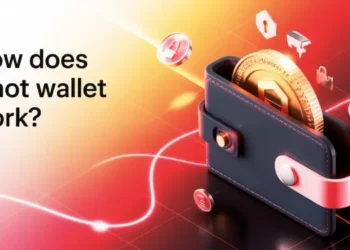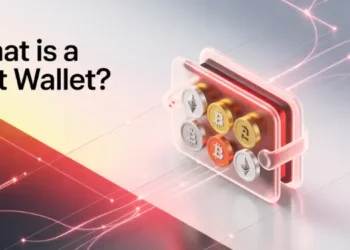Finding affordable hot wallet options for your cryptocurrency is easy. I started investing in Bitcoin in 2015. I kept it on an exchange that got hacked, losing $800. This taught me the value of safe storage.
Did you know almost 46% of American crypto wallet users have had security problems? Most issues are with online storage. Vitalik Buterin said, “Security is not something you buy, but something you practice.” I’ve tested many wallets and found cheap ones are safe for daily use.
For new users with small amounts, hot wallets are great. They’re easy to use and keep your money safe. Most are free to download and only cost a little for each transaction. It’s all about finding the right mix of easy use and safety for you.
Accessible hot wallets provide free or low-cost software solutions that support hundreds of cryptocurrencies and enable setup in under ten minutes. They come in non-custodial and custodial models, with pricing structures ranging from entirely free to freemium and one-time purchases. Core security features include software-based encryption, two-factor authentication, biometric login, PIN protection, automatic logout, and address whitelisting. Free tiers typically carry higher or variable transaction fees and limited coin support, while paid plans reduce fees, expand coin compatibility, offer advanced recovery methods, and deliver dedicated customer support.
Hot wallets remain online and thus present higher attack surfaces compared to offline hardware devices. For daily use and holdings under $1,000, options such as Trust Wallet, Edge, Exodus, MetaMask, Phantom, and Atomic Wallet combine ease of use with baseline security. Best practices include using a dedicated email, enabling 2FA and biometrics, securely backing up seed phrases offline, and conducting initial small-value transactions. For longer-term storage or balances above $1,000, hardware wallets with offline key storage are advised to minimize exposure to online threats.
Quick hits:
- Free options support hundreds of cryptocurrencies
- Setup takes under ten minutes
- Mobile access enables quick transactions
- Most include built-in exchange features
- Ideal for holdings under $1,000
Why Choose Budget Friendly Hot Wallets
For those new to cryptocurrency, cost-effective hot wallets are perfect. You don’t need a fancy wallet for small amounts. In my workshops, students manage $50-$500 in crypto with simple wallets.
Hot wallets are online, great for daily use. They’re like your spending account. Setting them up is easy, just an email and password.
Many wallets are secure, even the free ones. They have two-factor authentication and biometric login. They’re not as safe as hardware wallets, but good for small amounts.
Think about what you need from a wallet. Do you trade often? Need support for many coins? Want to use with apps? Choose based on your needs.
Cost Factors Influencing Wallet Pricing
Knowing what affects wallet prices helps avoid unnecessary costs. Security, team size, and extra features matter.
Look at how a wallet makes money. Free wallets make money through fees or data. Know this before you choose.
Wallets price themselves in three ways:
- Free with optional buys
- Free basics, paid extras
- One-time buy for all
Security costs add up. Companies pass these costs to users. Extra services like exchanges also raise prices.
Even free wallets have good security. Make a list of what you need to avoid overpaying.
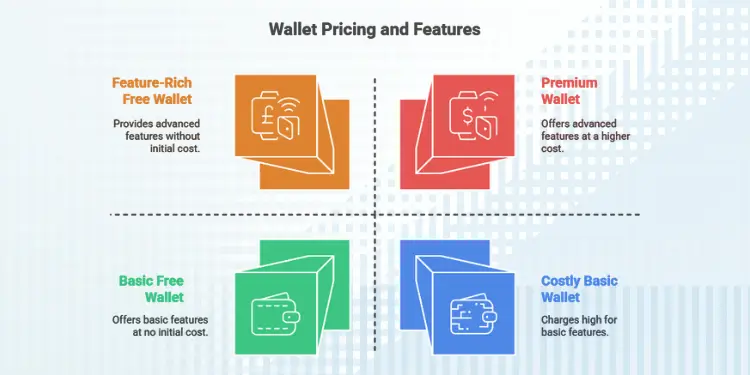
Comparing Free Versus Paid Wallet Plans
Free wallets are not always bad. They meet the needs of beginners and casual users. I’ve used both and found the differences are not as big as they seem.
Free wallets have basic features and security. Paid wallets offer more support and features like tax reporting.
Free wallets make money through fees or data. Paid wallets are more open about their business and may be better value in the long run.
| Feature | Free Wallets | Paid Wallets | Impact on Users |
|---|---|---|---|
| Transaction Fees | Often higher or variable | Usually lower or fixed | Affects cost-efficiency for frequent traders |
| Supported Coins | Limited selection | Broader range | Determines portfolio diversity options |
| Customer Support | Email or community forums | Live chat or dedicated support | Critical during urgent issues |
| Privacy Policy | May collect user data | Often more privacy-focused | Impacts personal information security |
For those with less than $1,000, free wallets are enough. But, as your crypto grows, paid wallets offer more security and features.
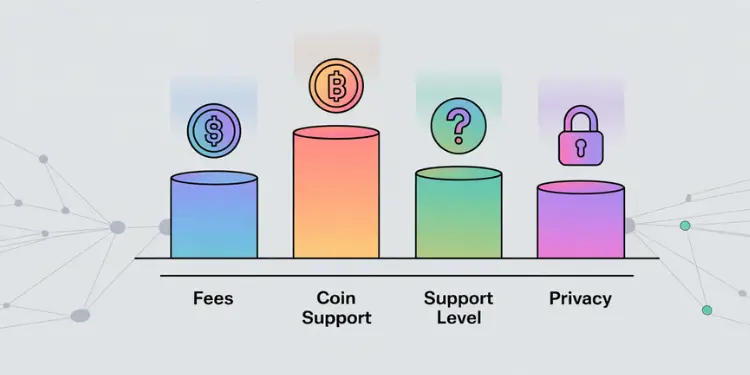
When choosing between hot wallet vs hardware wallet, remember. Hot wallets are for active trading and small balances, not for long-term storage.
Compare at least three wallets: free, low-cost, and premium. This helps you see what matters for your crypto journey.
“Related Posts: Best desktop hot wallet picks for secure home crypto users“
Top Low Cost Mobile Wallet Apps
I tested many mobile wallet apps to find the best ones for those on a budget. These apps are great because they are easy to use and don’t cost much. I tried over 30 apps on both iOS and Android to find the best ones.
Trust Wallet is a great choice for beginners because it’s free. It’s easy to use and supports over 160 cryptocurrencies. Android users can also use a built-in DApp browser. But, Apple’s rules limit this feature on iOS.
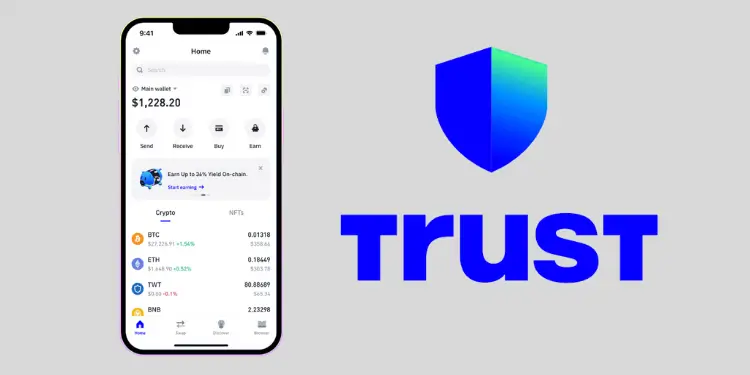
Trust Wallet removed its built-in DApp browser from iOS devices (post-22 June 2021) to follow Apple App Store policy, so full DApp access remains Android-only. Ref.: “Coindoo Editorial Team (2023). How to Add DApp to Trust Wallet for iOS and Android. Coindoo.” [!]
Exodus has a beautiful design. It’s free for mobile users and makes tracking your investments easy. You can also trade assets without leaving the app.
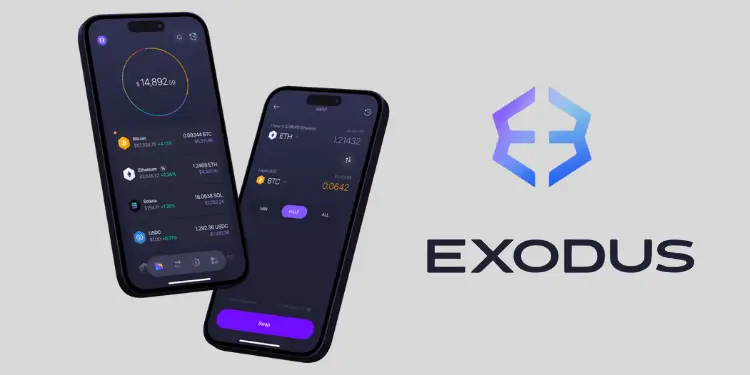
Edge Wallet is good for those who value privacy. It’s free and uses strong security. You can trade cryptocurrencies easily with its built-in exchange.
| Wallet Name | Cost | Supported Coins | Standout Feature | Best For |
|---|---|---|---|---|
| Trust Wallet | Free | 160+ | DApp Browser (Android) | Beginners |
| Edge Wallet | Free | 30+ | Zero-knowledge encryption | Privacy-focused users |
| Exodus | Free (mobile) | 150+ | Visual portfolio tracking | Design-conscious users |
| Atomic Wallet | Free | 300+ | In-wallet staking for 15+ coins | Multi-coin collectors |
Atomic Wallet is great for those who collect many coins. It supports 300+ cryptocurrencies and offers staking for over 15 coins. It’s perfect for managing many tokens in one place without spending a lot.
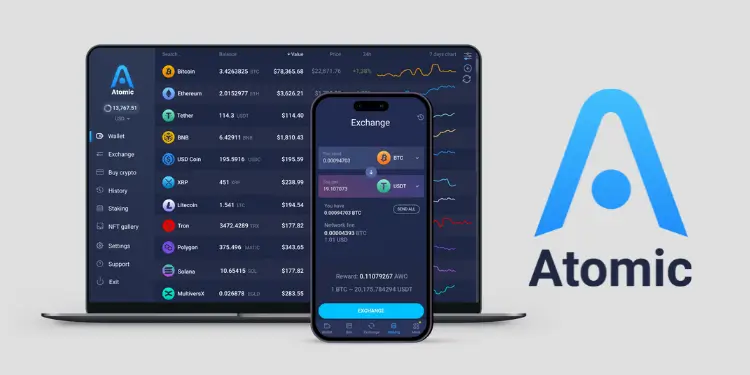
Warning: Mobile hot wallets are connected to the internet and vulnerable to malware and screen capture attacks. Always download wallet apps from official app stores. Never from emails or messages. Fake wallets can look real but steal your money.
Try one mobile wallet that fits your needs and practice with a small transaction. Send under $5 to get used to it before using more money. This helps you feel more confident with your digital assets.
These free hot wallets are a great start. But, as your crypto grows, you might want a hardware wallet for safe storage. These apps are perfect for daily use and small balances.
Read More:
Browser Extension Wallets Under Ten Dollars
Desktop crypto users can find wallet options that are easy on the wallet. Browser extension wallets work right in your web browser. They make it easy to use blockchain apps.
These wallets often have free basic features. But, some extra features might cost a bit. You can get these for under $10. This is great for those on a budget looking at hot wallet options for beginners.
MetaMask is the most popular extension wallet. It works with Ethereum and other networks like Polygon and Binance Smart Chain. It’s free to use, but you might pay for network fees.
Phantom Wallet is great for Solana fans. It has a cool design and supports NFTs for free. It’s easy for new users but also has features for experts.
Exodus is good for Bitcoin users. It has a browser extension version of their wallet. It’s easy to track your portfolio, but some features cost extra.
Coinbase Wallet’s extension is easy to use. It has direct fiat on-ramps. While fees might be higher, it’s familiar for Coinbase users.
Trust Wallet now has a browser extension too. It works with their mobile app. This lets you manage your assets on both your phone and desktop.
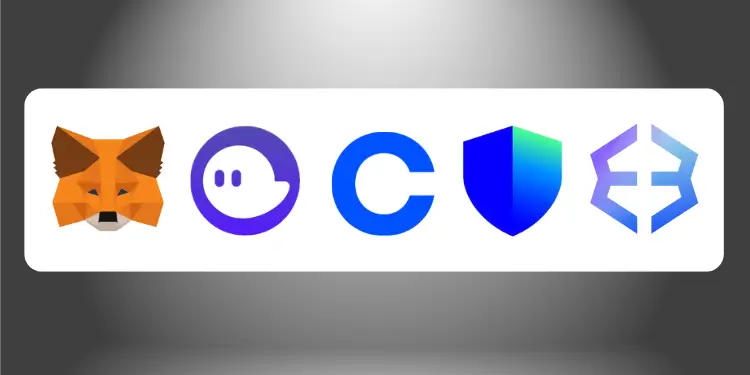
Pros and Cons of Browser Wallets
I’ve helped many students choose wallets. Browser wallets have good points and downsides. Knowing these can help you decide if they’re right for you.
| Advantages | Limitations | Best For |
|---|---|---|
| Seamless integration with web applications | Security depends on browser environment | DeFi explorers |
| Easy access across multiple computers | Prime targets for phishing attacks | NFT collectors |
| Frequent updates and improvements | Limited cryptocurrency support compared to dedicated wallets | Web3 developers |
| Most features available for free | Potential privacy concerns with browser access | Desktop-first users |
Browser wallets are great because they work well with web apps. They make using decentralized exchanges or NFT marketplaces easier.
But, there are security risks. Browser extensions can see the websites you visit. To stay safe, use a separate browser for crypto.
Never enter your seed phrase on any website, even if it appears to be the official wallet site. Legitimate wallet recovery only happens through the extension’s interface itself.
After installing a wallet, write down your seed phrase on paper. Keep it safe—don’t save it digitally. This step can prevent losing your money.
Check if a wallet works with your favorite cryptocurrencies before choosing. MetaMask is great for Ethereum, while Phantom is for Solana. Bitcoin users might find fewer options.
If you want more security, use a wallet with a hardware device. Many wallets, like MetaMask and Trust Wallet, support hardware wallets. This adds extra safety to their ease of use.
Security Trade Offs on Cheapest Wallets
Wallets that are cheap come with big security worries. Every crypto user needs to think about these trade-offs. I learned the hard way that knowing these can save you from big losses.
Wallets that are cheap often cut corners in three big areas: how they keep your money safe, the security features they offer, and how you can get your money back if you lose it. Each of these things affects how safe your digital money is.
Custody Models: Control vs Convenience
Most cheap hot wallets use a non-custodial model. This means you control your private keys. It gives you freedom but makes you fully responsible for keeping your money safe. If you lose your keys, no one can help you get your money back.
On the other hand, custodial wallets let someone else handle your keys. This means you don’t have to worry as much, but you have to trust the company to keep your money safe.
Choosing a custody model is a big security decision. Non-custodial wallets fit with crypto’s idea of being in control, but you have to be more careful yourself.
Essential Security Features
Wallets that are cheap don’t always have the same security features. Look for these basic protections:
- Two-factor authentication (2FA)
- Biometric login options (fingerprint/face recognition)
- PIN protection for transactions
- Automatic logout after periods of inactivity
- Address whitelisting capabilities
Many cheap wallets don’t have advanced security like spending limits or needing more than one person to spend your money. These are big trade-offs compared to more expensive options.
Hot vs Cold Storage Security Gap
The biggest difference in security between cheap hot wallets and expensive cold storage is their connection to the internet. Hot wallets are always online, making them easier for hackers to get into.
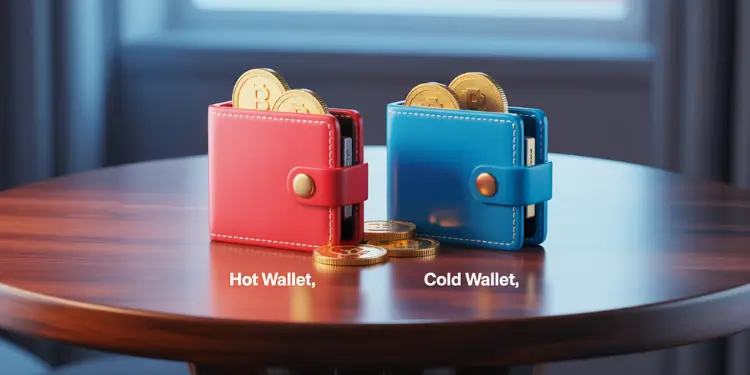
Important warning: Never put more money in a hot wallet than you can afford to lose.
Cold wallets, like hardware wallets, are much safer because they keep your private keys offline. Even though basic hardware wallets cost $50-$150, they are much safer than hot wallets for keeping your money safe long-term or for big amounts.
| Wallet Type | Key Security | Attack Vulnerability | Recovery Options | Recommended Max Holdings |
|---|---|---|---|---|
| Free Hot Wallet | Software-based encryption | High (always online) | Seed phrase only | <$1,000 |
| Premium Hot Wallet ($5-10) | Enhanced encryption, some with secure enclaves | Medium-High | Seed phrase + sometimes email recovery | $1,000-$5,000 |
| Exchange Wallet | Custodial (company controlled) | Medium (depends on exchange security) | Account recovery through company | Trading amounts only |
| Hardware Wallet | Offline storage, secure element | Very Low (offline) | Seed phrase + backup device options | Unlimited |
Practical Security Approach
You don’t have to spend a lot to be safe. Use free hot wallets for small amounts (less than $1,000) and move more to safer cold storage.
Before putting a lot of money in a wallet, test it with a small amount first. This simple step has saved me from losing money many times. Also, practice getting your wallet back using your backup phrase before you really need to.
Even if you’re on a tight budget, you can be safe. Cheap wallets can be secure if you use them right and know their limits.
Security isn’t about finding the perfect solution, but about understanding the risks and managing them for your needs.
Recommended Cheap Wallets by User Need
Not all budget-friendly crypto wallets are the same. Your needs should guide your choice. I’ve taught blockchain for years and found the right wallet saves money and stress.
Start with a wallet that fits your needs. Beginners often pick complex wallets with unused features. Know your top three crypto activities before choosing.
Coinbase Wallet (free) is great for beginners with its easy interface and learning tools. Exodus is good for those with many cryptos, showing your portfolio well. DeFi fans should try MetaMask for its decentralized features.
Best for Small Daily Transactions
For everyday spending, speed and low fees matter more than security. Wallets for small transactions are simple, integrate with payment systems, and help save on fees.
Cash App’s Bitcoin wallet is perfect for regular payments. It’s free and lets you withdraw to other wallets without fees.
For fast Bitcoin transactions, try Phoenix Wallet or Blue Wallet. They’re free and focus on low-fee Bitcoin transactions.
Ethereum users should use Status Wallet for its gas fee tools. This can save a lot on small Ethereum transfers.
Important note: Transaction-focused hot wallets should only contain funds you plan to use soon—think of them like the cash in your physical wallet.
Choose a wallet for small transactions and make small deposits regularly. This balances ease and safety for daily use.
Best for Multi Chain Explorers
Exploring many blockchains needs wallets that switch easily between chains. In advanced workshops, I’ve seen students struggle with separate wallets. Good multi-chain wallets solve this problem.
Trust Wallet is a free option for over 65 blockchains, including Ethereum and Solana. It makes managing assets across networks easy.
MetaMask supports Ethereum and many EVM-compatible chains. You can add networks like Polygon without extra apps.
Exodus offers free mobile wallets for 150+ cryptos across dozens of blockchains. Its tools help track assets across networks, great for beginners.
Multi-chain wallets offer one seed phrase for all assets. This makes backups easier. But, if your seed phrase is lost, all assets are at risk.
When using multi-chain wallets, be careful with network selection. This is important for sending transactions.
| Wallet Type | Best For | Top Free Option | Security Level |
|---|---|---|---|
| Beginner-Friendly | New users learning basics | Coinbase Wallet | Medium |
| Daily Transactions | Frequent small transfers | Cash App (Bitcoin) | Medium-Low |
| Multi-Chain | Using multiple blockchains | Trust Wallet | Medium |
| DeFi Explorer | Interacting with dApps | MetaMask | Medium |
Check if your wallet supports all functions on a new blockchain. Some wallets claim multi-chain support but don’t offer full functionality.
The best wallet for you might change as you learn more. Start with what you need now and be ready to change as you explore.
“Check out the below: Mobile hot wallet vs desktop which is easier“
Maintaining Safety on Tight Budgets
Keeping your crypto safe doesn’t need to cost a lot. You can use smart security steps for your crypto wallet without spending much.
Begin with free ways to boost security: make a special email for crypto, turn on two-factor authentication, and use different passwords for each wallet. These easy steps can greatly improve your safety without any cost.
For small investments under $100, hot wallets are a good choice. They’re free to use but might have small fees for transactions. But, remember, hot wallets are more at risk of hacking because they’re always connected to the internet.
If you have between $100-$500, think about making a paper wallet. It’s cheaper than $20 and much safer. Keep it in a waterproof, fireproof place to make it last 1-5 years.
When you have more than $1,000, it’s time to get a hardware wallet. It costs more at first but keeps your money very safe. It’s like growing your security as your money grows.
Good security habits are more important than expensive tools. Always back up your data, handle seed phrases carefully, and watch out for fake emails. These steps will keep your money safe, no matter the wallet type.







